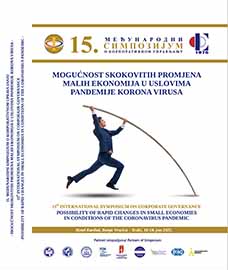OD LINEARNE DO CIRKULARNE EKONOMIJE: PRIMJER IZ BOSNE I HERCEGOVINE
FROM LINEAR TO CIRCULAR ECONOMY: AN EXAMPLE FROM BOSNIA AND HERZEGOVINA
Author(s): Zdravko Todorović, Igor Todorović
Subject(s): Economy, National Economy, Business Economy / Management, Micro-Economics, Energy and Environmental Studies, Accounting - Business Administration, ICT Information and Communications Technologies
Published by: Finrar d.o.o Banja Luka
Keywords: linear economy; circular economy; recycling; waste; sustainable development;
Summary/Abstract: Waste is today considered one of the most significant environmental problems of the modern world. Man, with his activities, is a decisive factor in changing and polluting the environment. Nature does not know waste, waste is the work of man. The research problem is a waste-generating economy model. From the beginning of the industrial revolution, man decided to abandon the circular model of the economy and to move in a straight line. He adopted a linear model of the economy that takes resources from nature,processes them into products, which are thrown away after use and create waste. The linear economy model on the one hand brought rapid economic growth and development, increased productivity, population growth, raising living standards, development of new technologies and knowledge, but on the other hand the linear economy model created catastrophic environmental problems, uncontrolled use of resources, allowed rich global access to resources, changed political and military power, stratified the population into a small group of rich and mass poor, created excessive consumerism, led to drastic climate change and the like. The world has realized that the linear economic model must change.The first phase in the transition from a linear to a circular economy is the recycling economy. The goal is to recycle discarded products and return them as raw materials to a new process. A special problem is the cleaner “planet” than previous waste. The next phase is a systematic approach to economic change that aims to design business systems in such a way that products after use can be easily returned as raw materials to the business process and be zero waste. These changes require all stakeholders to be involved in the change process. Economic progress cannot be stopped, but it can be slowed down for sustainable development. The paper presents the development of economic models and presents the process of transition from linear to circular economy. A special contribution of the paper is the analysis of the state of the economic model in Bosnia and Herzegovina and the comparison with the circular model in the European Union. The discussion analyzes the situation in the field of circular economy in Serbia, Slovenia and Croatia.
Book: 15. MEĐUNARODNI SIMPOZIJUM O KORPORATIVNOM UPRAVLJANJU
- Page Range: 377-390
- Page Count: 14
- Publication Year: 2021
- Language: Serbian
- Content File-PDF

